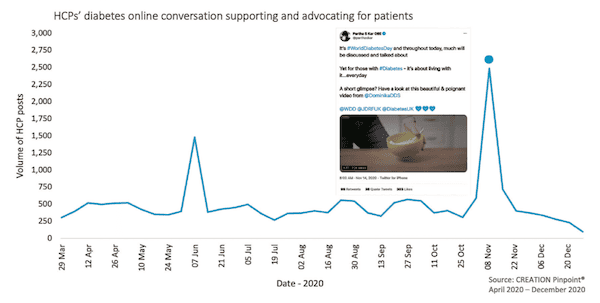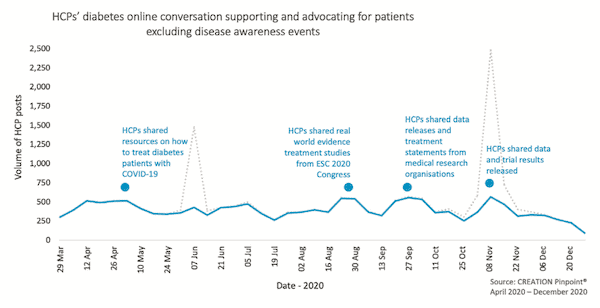For a patient, meeting people with similar experiences can be invaluable to those affected by the same disease. Groups
supporting patients offer a chance to talk to others, share concerns and get advice from other people that understand them. Support groups have a number of functions, including educating patients and their family, raising disease awareness, fundraising, sharing patient experiences and providing support and strength to its members.
The International Diabetes Federation estimated that in 2019 there were around 463 million people worldwide that have diabetes. With a disease that affects so many people globally, it is no surprise that there is large emphasis on patient support groups, with patients attending support groups being more successful at managing their health.
Patient advocacy groups play a key role in providing and running these patient support groups, as well as using their online and offline presence to support patients. Groups such as the Diabetes Advocacy Alliance work to raise awareness among policymakers and legislators in the United States, while others, such as Diabetes.co.uk, provide a Europe-wide community that brings together disease information and patient support into one place.
As patients cannot see their support groups face to face and may be more isolated during the COVID-19 pandemic, the online engagement and support services of these groups are even more important. Across online platforms such as Twitter, Instagram and Facebook, activity has increased compared to the same period pre-pandemic, as people seek to make connections in a more isolated world.
These patient groups are not the only ones online that are showing and offering patient support. Healthcare professionals (HCPs) are also actively advocating for and engaging with patients online. Some behaviours we see from HCPs in supporting patients include raising disease awareness, highlighting patient stories and engaging with their HCP peers to find ways to best treat their patients.
From April to December 2020, over 8,500 HCPs globally engaged in conversation sharing over 20,000 posts about patients, in relation to diabetes. Throughout this period it is clear that patients are on the minds of HCPs, and at the forefront is engagement with disease awareness events.

HCPs engage in raising disease awareness
World Diabetes Day on 14 November drew most of the HCP diabetes patient conversation, with a tenth of the overall conversation happening around this event.
There are a number of online social media accounts that are active around awareness events and that are engaged with by HCPs. Diabetes consultant, Partha Kar’s Twitter account was mentioned over 250 times by his HCP peers. Diabetes UK, as mentioned previously, which has a large European network of patients and patient support services was mentioned 328 times.
The World Diabetes Day Twitter account was mentioned just over 210 times by HCPs around this awareness event. HCPs are definitely contributing to spreading disease awareness and supporting patients around these events.
Typically it is seen that HCPs share content from these accounts that are targeted at specific disease awareness events. Such as a post from Ana Piera, a doctor in Spain, who uses an image from World Diabetes Day and linked to an important topic of the day – that many diabetes patients are at risk of heart failure or stroke.
We often see that nurses are at the forefront of patient engagement and raising awareness. In the diabetes space we see that there are a number of roles engaged, however nurses actively participate throughout the year.
Nneka Agbasi, a nurse matron, shared an infographic highlighting how patients may be feeling and what they are thinking about. She points out that diabetes affects you both mentally and physically. She also shares where patients can get support to understand their disease better.
HCPs highlight patient stories and successes
HCPs have become more comfortable recently to share their own anonymised patient stories and successes online, bringing hope and encouragement to other patients and HCPs treating these patients too. These stories help to bridge the gap between the scientific side of the disease (including the treatment approach and medication) and the experiences of patients.
An example of this is highlighting large scale successes such as a post by Jen Unwin, a consultant clinical health psychologist. Dr Unwin celebrates the 86 patients who have achieved diabetes remission due to the treatment and lifestyle changes they have made. HCPs also discuss individual patients. Clare Nieland, a GP, highlights her patients’ success controlling their disease using diet, showing a graph of the change in HbA1c levels.
Sharing successes is a key behaviour in patient support groups, and an important way to raise awareness and provide insight into the patient experience. This type of engagement also provides a way for people to feel connected with one another, as can be seen in the responses that are received on posts.
An example of this is a post highlighting a patient’s success shared by opthalmologist Will Flanary, who goes by the name of Dr Glaucomflecken. His social media post was engaged by both patients and HCPs over 190 times, with those commenting congratulating the patient.

HCPs engage with their peers on how to best treat patients
Outside the disease awareness conversation, HCPs continuously discuss patients. Much of this conversation includes new data releases at medical congress, such as the peak in August and September, that could benefit their patients, while other conversations focus on specific patient cases.
In the graph above a peak can be seen in May, at the beginning of the COVID-19 pandemic. With so much uncertainty around how to treat diabetes patients with COVID-19, HCPs took to social media to support their peers with resources on the risks and how to treat these patients. This conversation was led by a post from Eric Topol, a physician scientist, sharing a new study on the mortality risk of COVID-19 for diabetes patients, shedding some much-needed light for both HCPs and patients during such an uncertain time.
Other ways that HCPs engage with their peers to support their patients are by sharing treatment approaches or helpful tips. HCPs are constantly looking at new and better ways to support their patients. A number of HCPs therefore spend much of their online activity providing infographics or information on best practices.
In one post Paul Mason, a registrar in sports and exercise medicine, shared with his network that 1 in 5 type 2 diabetes patients also have autoimmune diabetes, so testing is “very worthwhile”. Alongside this comment he shares images of the study, referencing testing and the literature.
Other HCPs seek advice from their online peers. This is where the online space is so important, as information and a ‘colleague’s’ opinion can be found relatively quickly. A patient can be supported from the collective intelligence of other specialists across the world. Colleen Farrell, a pulmonary and critical care fellow, asked her online peers a question about diabetes patients with COVID-19 and received responses from colleagues in the UK, the United States and India, to name a few.
Often seen as the domain of advocacy groups and patient support organisations, patient support as seen here can come from a number of interested individuals, including HCPs. These HCPs use the online space to raise disease awareness, highlight patient stories and engage with their HCP peers to find ways to best treat their patients, providing an important piece of the puzzle to the patient journey.
During this time the digital space has become an even more important part of building patient support and engagement strategies. Identifying and partnering with the key HCPs involved in this online conversation and understanding the needs and digital behaviours of HCPs in general is critical to having effective online tactics and ultimately supporting patients better.




